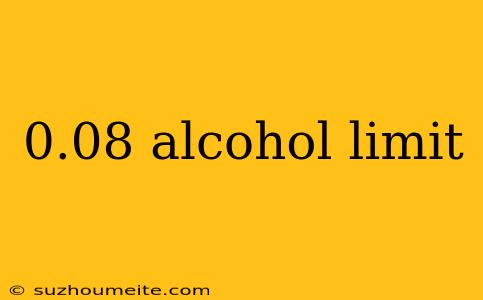The 0.08 Alcohol Limit: Understanding the Legal Blood Alcohol Concentration
Introduction
In many countries, including the United States, the legal blood alcohol concentration (BAC) limit is 0.08%. This means that if a person's BAC is 0.08% or higher, they are considered to be legally intoxicated and can be charged with driving under the influence (DUI). But what does this limit really mean, and how does it affect our bodies?
What is Blood Alcohol Concentration?
Blood alcohol concentration (BAC) is the percentage of alcohol in a person's bloodstream. It is usually measured by a breathalyzer test or a blood test. The BAC is calculated by dividing the amount of alcohol in the blood by the volume of blood.
The Effects of a 0.08 BAC
At a BAC of 0.08%, a person's cognitive and motor skills are impaired. They may experience:
- Impaired Judgment: Difficulty making rational decisions and judgment.
- Slurred Speech: Speech may be slow, slurred, or difficult to understand.
- Loss of Coordination: Difficulty with balance, walking, or standing.
- Impaired Vision: Blurred vision, double vision, or loss of peripheral vision.
- Increased Risk-Taking: Engaging in risky behavior, such as driving recklessly.
How Long Does it Take to Reach a 0.08 BAC?
The time it takes to reach a 0.08 BAC varies depending on several factors, including:
- Body Weight: A smaller person will typically reach a higher BAC faster than a larger person.
- Gender: Women tend to reach a higher BAC faster than men due to differences in body composition and metabolism.
- Type of Drink: The type of drink, such as beer, wine, or liquor, affects how quickly the alcohol is absorbed into the bloodstream.
- Consumption Rate: Drinking quickly or binge drinking can lead to a higher BAC.
On average, it takes about 4-5 drinks for a 160-pound person to reach a 0.08 BAC. However, this can vary significantly depending on individual factors.
Consequences of Exceeding the 0.08 Limit
If you are caught driving with a BAC of 0.08% or higher, you can face serious consequences, including:
- Fines: Monetary penalties for DUI offenses.
- License Suspension: Suspension or revocation of your driver's license.
- Jail Time: Possible incarceration for DUI offenses.
- Increased Insurance Rates: Higher insurance premiums due to a DUI conviction.
- Criminal Record: A permanent criminal record for DUI offenses.
Conclusion
The 0.08 alcohol limit is an important threshold for defining legal intoxication. Understanding the effects of alcohol on the body and the risks associated with exceeding this limit can help prevent accidents and save lives. Remember to always drink responsibly and never drink and drive.
